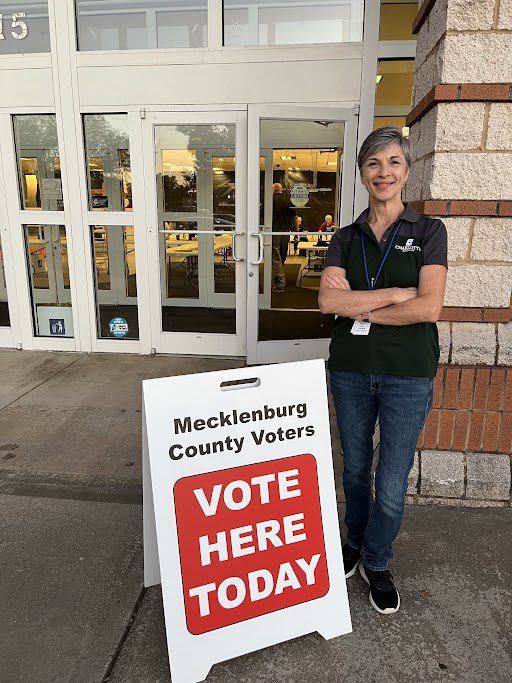The experience of an election worker

Colette Chenault provides administrative support to the Honors College, but during election season, she supports the democratic process. Since 2016, Chenault has worked as a temporary employee for the Mecklenburg County Board of Elections. She shares what it’s like to work on election day, why everyone should volunteer to work in a presidential election once in their lives and her key advice for Mecklenburg County voters.
Working the polls
Chenault worked in the presidential election in 2016 and for the early voting period during the 2020 presidential primary. She said these are two separate processes. On election day, Chenault is one of three judges serving as the leadership team for Mecklenburg County’s largest precinct. There is a chief judge, a democratic judge and a republican judge. As a registered unaffiliated voter, Chenault has served as a judge for both political parties.
Election workers may seem like powerful figures in the political process, but Chenault noted the people who make the democratic process run smoothly are regular members of their communities.
“We are not full-time employees, and we do not make the rules,” Chenault said. “We’re your neighbors who have stepped up and given our time to try to make this process the best we can.”
Election day is an arduous process with workers arriving at polling sites at 5:30 a.m., and they remain on location to break down the voting sites when the polls close at 7:30 p.m. Still, Chenault recommends everyone volunteer for one election in their lifetimes.
“It’s really neat to be a part of the democratic process,” Chenault said. “You meet really interesting people while working elections. They come from all walks of life.”
Poll working does have challenges. Chenault was a site coordinator during the 2020 election when Mecklenburg County got last-minute funding to open 11 new voting locations prior to the election.
Voters also can pose challenges. Chenault joked it isn’t an election until she gets yelled at by a voter. However, she sees the good in humanity while working the polls.
“It means so much to me when I get a voter who doesn’t know the laws, and we have a conversation, and I educate them. They are usually just very thankful that I was able to help them through the process,” Chenault said.
Advice for the UNC Charlotte Community
Election laws are dictated by the state, so knowing these laws are critical. For the UNC Charlotte community, some employees and students may live out-of-state in South Carolina.
“We’ve got people that work together who live in two different states, and they start talking about election stuff and there is a lot of confusion and misunderstanding,” Chenault said.
She added knowing voting districts are important. This determines who individuals can vote for in local elections for positions like county commissioner and members of the school board or city council.
“Just because you get contacted by a candidate doesn’t necessarily mean you can vote for them,” Chenault said.
For this year’s presidential election, Cone University Center is an in-person early voting location for students, faculty, staff and the general public who live in Mecklenburg County. Students who live out-of-state but wish to register to vote in Mecklenburg County must change their residencies to their campus living arrangements.
2024 marks the first election in which many first-year students will be able to cast a ballot for a presidential election. Chenault’s first piece of advice is to visit one’s state Board of Elections website to ensure they are registered to vote. If not, take advantage of early voting where you can register and vote at the same time.
Another piece of advice is to conduct research. Download a sample ballot (North Carolina, South Carolina) and plan your vote in advance before entering the booth. Chenault said this is particularly important when it comes to local municipal and county positions.
“People say that the president is the most important election, I would argue your local elections are where the things that impact you on a daily basis are decided,” Chenault said.
See Chenault in action at the early voting center at the location of the former Kohl’s store across from the North Tryon entrance of campus. If you want to join her in helping with Mecklenburg County elections, state employees can use their balance of community service leave to serve with their county’s Board of Elections as nonpartisan poll workers this fall.